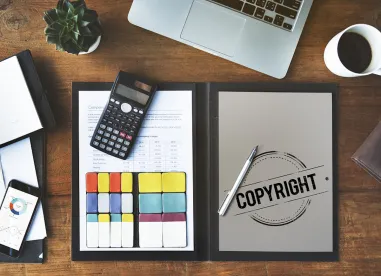Welcome to this week’s issue of AI: The Washington Report, a joint undertaking of Mintz and its government affairs affiliate, ML Strategies.
The accelerating advances in artificial intelligence (“AI”) and the practical, legal, and policy issues AI creates have exponentially increased the federal government’s interest in AI and its implications. In these weekly reports, we hope to keep our clients and friends abreast of that Washington-focused set of potential legislative, executive, and regulatory activities.
In this issue, we discuss recent developments relating to AI and copyright. Our key takeaways are:
- US lawmakers are considering a range of potential reforms to copyright law, including a federal right of publicity, to account for the rise of generative AI products and services.
- So far, no major legislative proposals on AI and copyright have been introduced in Congress.
- Recent guidance from the US Copyright Office states that a work’s ability to receive copyright protection depends in part on “whether the ‘work’ is basically one of human authorship…or whether the traditional elements of authorship in the work…were actually conceived and executed not by man but by a machine.”
Evolving US and International Approaches Related to Copyright Law and Artificial Intelligence
On July 7, 2023, popular comedian Sarah Silverman and several others sued OpenAI, the creators of ChatGPT. The complaint alleges that Silverman’s memoir, The Bedwetter, was “copied by OpenAI without consent, without credit, and without compensation.” On the basis of this allegation, the complaint claims that “the OpenAI Language Models are themselves infringing derivative works, made without Plaintiffs’ permission and in violation of their exclusive rights under the Copyright Act.”
Regardless of whether the court accepts Silverman’s argument, this high-profile case highlights a tension that has only grown as technology giants have begun to profit from products made with generative AI models: should copyright holders be consulted, recognized, and compensated when such models are trained on their copyrighted works?
As of August 2023, Congress is still in the information-gathering and consultation stage of producing comprehensive AI regulation. In the absence of concrete legislative proposals, indications of how the United States might seek to apply or even reform copyright law in the age of AI can be suggested by congressional hearings, US Copyright Office (“USCO”) guidance and decisions, and the activity occurring in non-US jurisdictions.
Senate Judiciary Hearing on AI and Copyright
On July 12, 2023, the Senate Judiciary Committee’s Subcommittee on Intellectual Property held a hearing on AI and copyright. During the hearing, senators expressed doubt that the current copyright laws can properly protect artists and creators given the advent of commercialized generative AI products. Senator Marsha Blackburn (R-TN) questioned whether “unlicensed AI ingestion of copyrighted works…be considered fair use when the output of AI replaces or competes with the human generated work.” Subcommittee Chair Chris Coons (D-DE) stated that it is “critical to include IP considerations in any regulatory framework for artificial intelligence.” Coons further argued that Congress should “consider whether changes to our copyright laws or whole new protections…may be necessary…”
One of the new copyright protections “test driven” by Coons is a federal right of publicity. The right of publicity mandates that to commercially exploit aspects of an individual’s personal identity, consent must be solicited from that individual. Currently, about half the states have recognized the right of publicity. While some have long been calling for a statute establishing a federal right of publicity, the advent of generative artificial intelligence has brought new purchase to this argument. During the hearing, Coons said that establishing a federal right of publicity may be “necessary to strike the right balance between creators’ rights and AI’s ability to enhance innovation and creativity.”
Throughout the hearing, senators were careful to note that copyright reforms should not come at the expense of competing demands, such as innovation and AI model fairness. Senator Alex Padilla (D-CA) noted that since an AI model “can only understand what it is taught,” it is important for “AI companies to train their models with data that captures the full range of the human experience.” Padilla argued that the imperative to “avoid copyright infringement” must be balanced by the need to “be as inclusive as possible” in the types of data training a given model. In a similar vein, Chair Coons cautioned that proposed reforms must “balance respecting copyright” with “incentivizing investment in AI and accelerating innovation in the United States.”
US Copyright Office Guidance on AI and Copyright
Given the tangle of urgent questions raised by the rise of generative AI, the US Copyright Office (“USCO”) has not waited for legislative reform from Congress to begin providing guidance to AI developers and creatives.
On March 16, 2023, USCO published Copyright Registration Guidance: Works Containing Material Generated by Artificial Intelligence in the Federal Register. The guidance states that since “copyright can protect only material that is the product of human creativity,” if “a work’s traditional elements of authorship were produced by a machine, the work lacks human authorship and the [USCO] will not register it.”
As part of the process of determining whether a work containing elements of human authorship and AI-generated material deserves copyright protection, the USCO asks “whether the ‘work’ is basically one of human authorship, with the computer [or other device] merely being an assisting instrument, or whether the traditional elements of authorship in the work (literary, artistic, or musical expression or elements of selection, arrangement, etc.) were actually conceived and executed not by man but by a machine.”
A prominent example of USCO applying this process is its February 2023 decision on Zarya of the Dawn (”Zarya”). Author Kris Kashtanova utilized the generative AI platform Midjourney to create images to accompany her text for the Zarya graphic novel, applying for copyright protection for the work. In reviewing Kashtanova’s application, the USCO concluded that the author does own the text and the “selection, coordination, and arrangement of the work’s written and visual elements.”
However, the USCO ultimately ruled that “the images in the Work that were generated by the Midjourney technology are not the product of human authorship,” and therefore, “Ms. Kashtanova is not the author for copyright purpose of the individual images generated by Midjourney.” The USCO reasoned that because “Midjourney starts with randomly generated noise that evolves into a final image, there is no guarantee that a particular prompt will generate any particular visual output. Instead, prompts function closer to suggestions than orders, similar to the situation of a client who hires an artist to create an image with general directions as to its contents.”
In addition to considering authorship issues, the USCO has begun to explore the question of the use of copyrighted material in training AI models. On March 16, 2023, the USCO announced the launch of a new initiative “to examine the copyright law and policy issues raised by artificial intelligence (AI), including the scope of copyright in works generated using AI tools and the use of copyrighted materials in AI training.” Over the spring of 2023, the USCO held a series of public listening sessions with creatives, attorneys, AI developers, and other stakeholders.
In late 2023, the USCO plans to publish a notice of inquiry to solicit public comment on the issue of AI and copyright.
Approaches to AI and Copyright: EU, Japan, and the PRC
While acknowledging that legislative reform is needed to update copyright laws for the AI age, Congress is only in the beginning stages of coming up with a copyright proposal. Senate Majority Leader Chuck Schumer (D-NY) has made “addressing copyright concerns” a policy objective of his SAFE Innovation Framework and has announced that at least one AI Insight Forum will concern the issue of AI and copyright.
Other jurisdictions have already staked out concrete positions regarding the application of copyright law to AI.
European Union
In its current draft form, the European Union’s (“EU”) AI Act would institute a transparency requirement mandating that providers of generative AI systems “without prejudice to Union or national or Union legislation on copyright, document and make publicly available a sufficiently detailed summary of the use of training data protected under copyright law.”
Japan
Japan, meanwhile, has taken an approach that is very favorable to AI on the issue of copyright. Under the 2018 revisions to the nation’s copyright law, it is “permissible to exploit a work, in any way and to the extent considered necessary…if it is done for use in data analysis…” This provision has broadly been taken to mean that under the current law, developers can use copyrighted works to train AI models without requesting the permission of copyright holders.
However, future legislation in Japan may alter this standard. An IP policy blueprint adopted in June 2023 stated that the government would consider the matter of AI developers’ use of copyrighted materials to train models. In a meeting following the adoption of the blueprint, Prime Minister Fumio Kishida stated that the government will “consider necessary measures, including responses to specific risks such as copyright infringement.”
People’s Republic China
In the People’s Republic of China (“PRC”), a series of court cases have staked out a circumscribed space for AI-generated works to be recognized under the nation’s copyright law. In Beijing Film Law Firm v. Beijing Baidu Network Information Technology Co., Ltd. (2019), the court ruled that works generated solely by AI cannot be copyrighted. This case was followed up by Shenzhen Tencent v. Shanghai Yingxun (2019), in which the court determined that content produced only in part by AI can be protected by the nation’s copyright law. Together, these cases suggest that the courts are currently interpreting China’s copyright law as allowing for the protection of AI-generated works only if there is a certain degree of human involvement in the creation of the work.
Raj Gambhir, Project Analyst in the firm’s Washington DC office, also contributed to this article.






 />i
/>i

